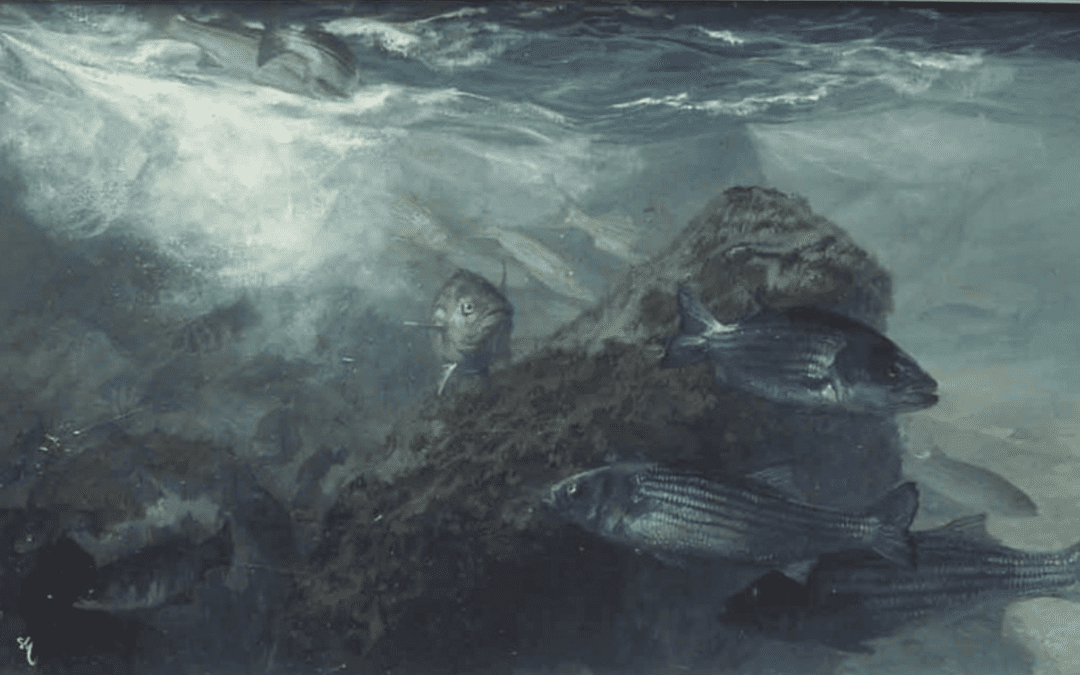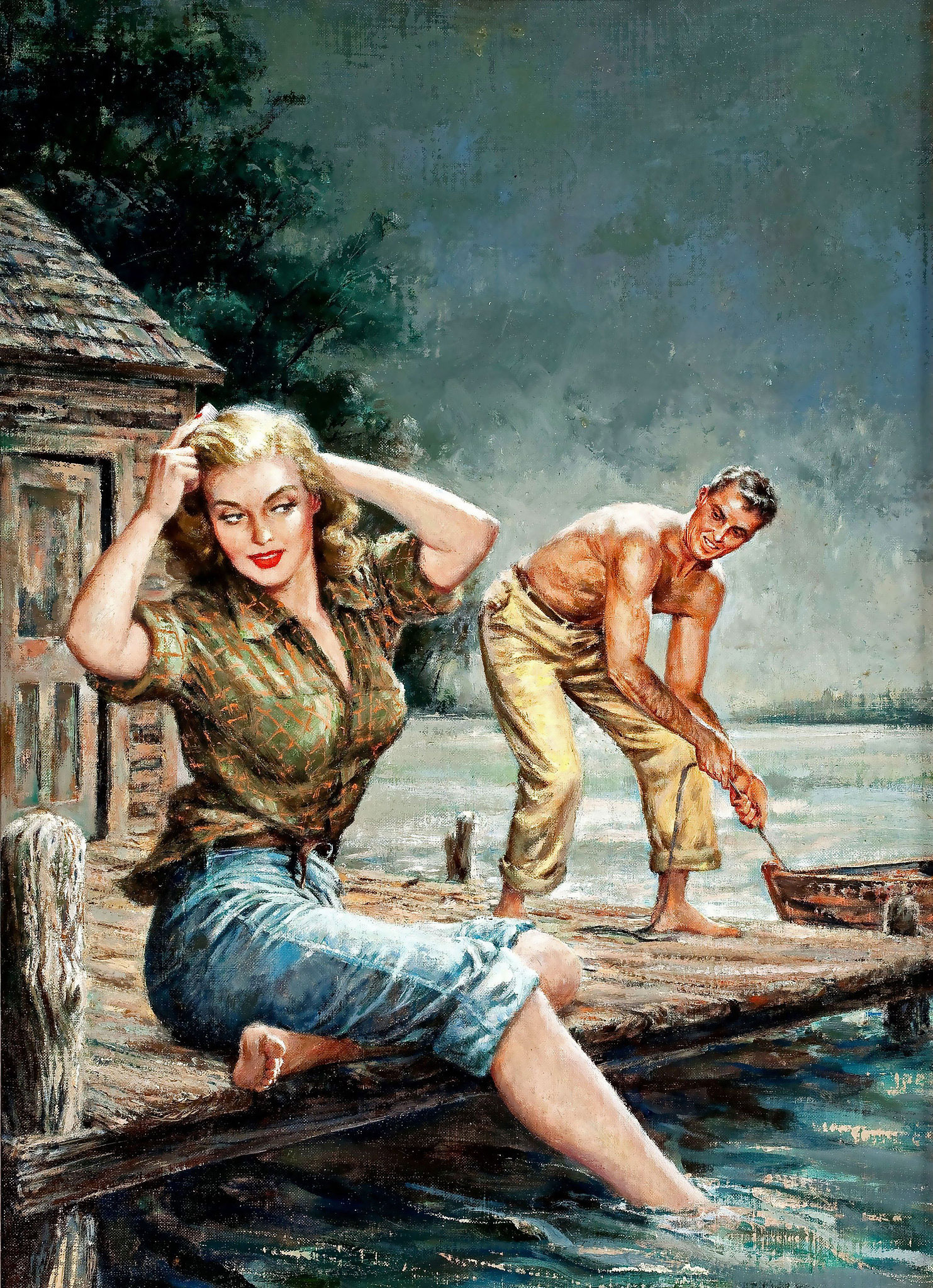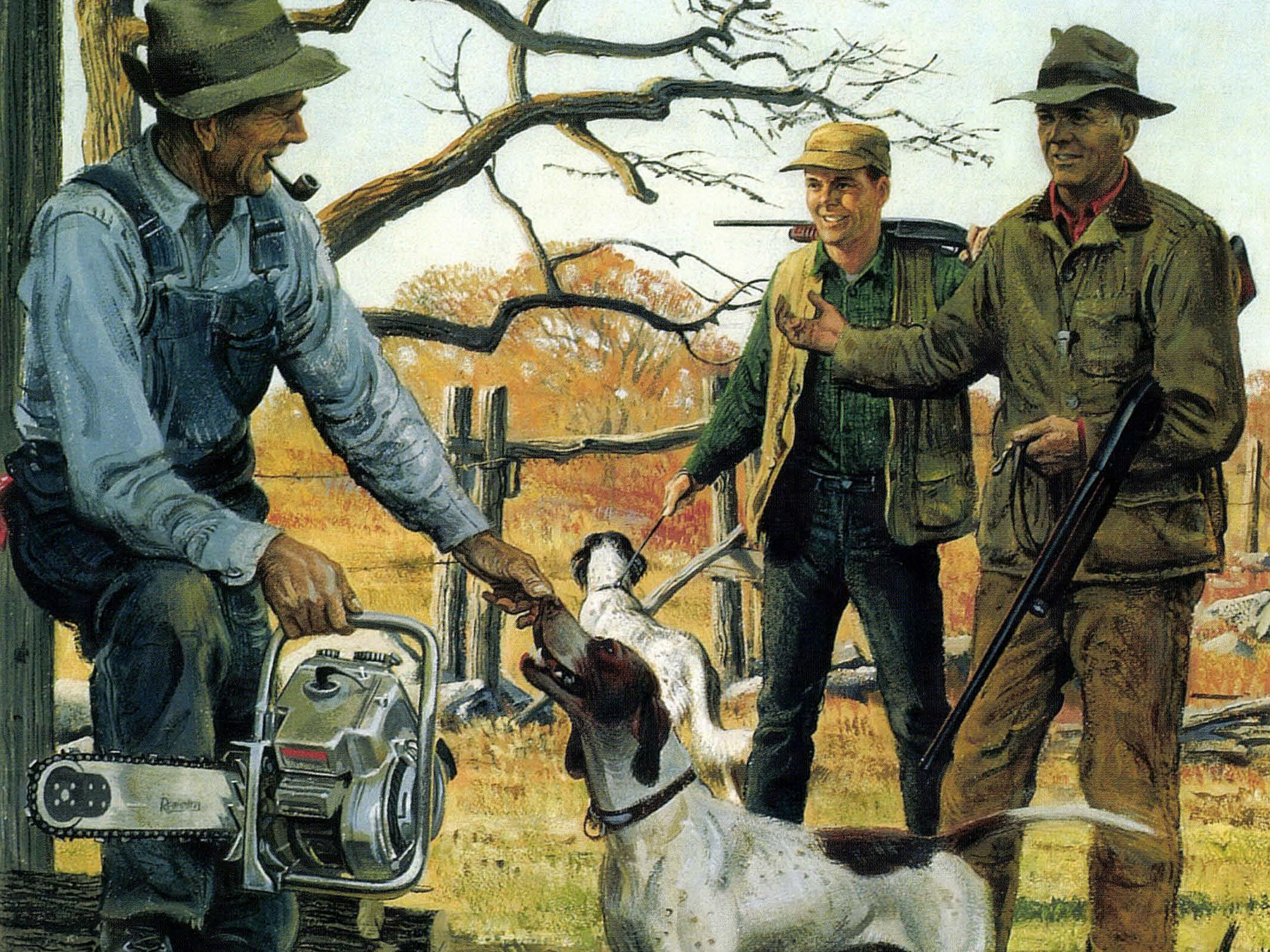Roccus fed and strengthened, yet did not grow in size. Despite her healing, her feeding, her strengthening, she continued to waste away.
Roccus sank to the bouldered deeps off Mashnee. The hooks of the plug were merely an annoyance, the weight of it a nuisance, which did not greatly alarm her. She had rid herself of similar lures before. Behind her as she swam trailed 120 feet of 45-pound-test nylon line and three feet of nylon leader. Before dusk all except a foot of the line had been cut off by the sharp edges of barnacles, mussels and rocks. She expelled with an exertion that tired her and somehow caused her to be tense. Awkwardly, she fed through squid though she was not hungry. She sought the reassurance of normality.
Roccus’ jaw healed swiftly, causing her no pain. As June waned she joined first one and then another of the many schools of striped bass that remained in the area of Cape Cod Canal. Some of these fish were from the Chesapeake region and more were native to the Hudson and its tributaries. There were few from the Rocmoke; most of the migrating Roanoke fish had come no farther north than the Jersey coast.
All these fish in the canal area move back and forth with the tides through the big ditch, driving whiting from the bottom to the surface, where in the rips, they skitted furiously, heads out of water, terrorized. The bass rose beneath them in pursuit, tail-smashing to stun them.
Day and night the anglers lined the canal riprap to cast for the bass, using eelskins on weighted rigs during the darkness and plugs in daylight hours. Favorite spots were crowded. These were adjacent to the swiftest rips and had been given names common among the angling fraternity.
Some of the names were Halfway Gate, Split Rock, the Mussel Bed, the Cradle, Lobster Pound, Lumber Yard, Paddy’s Rock, the Beacon, the Herring Run, the High Tension, Portugee Hole and the Basin. There were a score more. Some men fished all night and slept in the daytime in cars parked in a wooded section under the Bourne highway bridge. Some fished for market, some only for sport; others fished for sport, yet marketed their catch so they could meet expenses and continue to fish for fun.
When the bass were choosy, or chasing whiting far out in the middle of the canal, hard to reach, many of the fishermen lived for days on nothing more substantial than coffee and doughnuts. Restaurants stayed open all night to cater to them, and these, on the slack tides, were crowded with anglers who were waiting for rips to make up. They had only one subject of conversation – striped bass. There was none but dreamed of catching a record fish. None really expected to. They were a red-eyed, bewhiskered, somewhat odoriferous congregation of zealots.
Roccus scattered the stars and seized a compressed slab of moonlight, swallowing it.
The July moon beamed on waters slapped by the tails of late-arriving menhaden moving inshore along both sides of the cape. There were many thousands in each school and there were countless thousands of schools. Into one dimpling over three fathoms deep Roccus drove again.
Other fish were feeding on the pogy—many other bass, squeteague, late pollock, the first of the bluefish, blue and hammered sharks, bonito, dolphin and, in deeper waters, broadbill swordfish and whales. Nearly all life of the ocean fed on the menhaden. Lobstermen seined them for bait. Fleets of white vessels seined them by the millions for oil and fertilizer. They swam fin to fin, tiers deep, the most abundant species in the Atlantic fishery. They were late arriving because the sea on the shoals had been late to warm. Now they would summer in the bays and harbors, the inlets and surf, waxing fatter and oilier on algae, sediment of organic decay and minute crustacean life, and their enemies from the land and of the sea would deplete their numbers by millions, yet fail appreciably to deplete their population. For each mature menhaden moving inshore had spawned more than 100,000 eggs. They were a countless streaming under the stars of the tide, showering as Roccus drove again.
When the July moon filled, Roccus returned to the lie by the Bird Island boulder, gorged with pogy, and at two o’clock of a morning, when the light on tile water was one six-hundred-thousandth of the brilliance of the midday sun, she moved into the circle of a seine. She felt it against her tail before she saw it; she felt it against her side. Lesser bass, also trapped, began in excitement to mill around her. She surfaced and found no escape; she sounded and encountered wide-mesh twine. She swam the closing circle of the seine, brushing against it. Some of the smaller bass were gilled, thrashing, floundering. But she was not greatly alarmed. In the Roanoke, in an arm of the Chesapeake, once in the Hudson, she had been in nets before. From traps, like most bass, she always found her way; these were the offshore weirs with openings never closed except on low water. This trap was different; its opening already had closed, its diameter was closing.
Roccus moved slowly in a half-circle, well inside the closing wall of mesh. Then, with a rush and thrust that scattered the smaller bass, she surged to the surface, flashed like a bright spearhead in the July moonlight, and re-entered the protecting water a fathom clear of the net floats. The thrust of the broad tail carried her to the channel past Bird Island and the safety of the flowing depths. She passed a pod of pogy, scattering them in a frenzy of flashing silver; then slowing to alert movement along the margin of the channel.
In the moon’s last quarter Roccus re-entered the canal, following schools of spike and tinker mackerel, feeding only at night, lying on the bottom with lesser fish during the hours of sun. Her appetite diminished and she was easily satisfied. She no longer pursued the darting whiting to the surface to whack them and gorge them. She moved lazily after eels, not eager for their taste. As the water warmed, her stripes darkened from brown to deep blue, and a reddish hue appeared on the edge of her gill covers. Sea lice left her for fish traveling to the surf. A benign lassitude of old age crept upon her.
Lovely and peaceful beat the sea of summer; cruel with death. Schools of small tuna were annihilating squid. Giant bluefins were decimating the mackerel shoals. Stalking the big tuna came the killers.
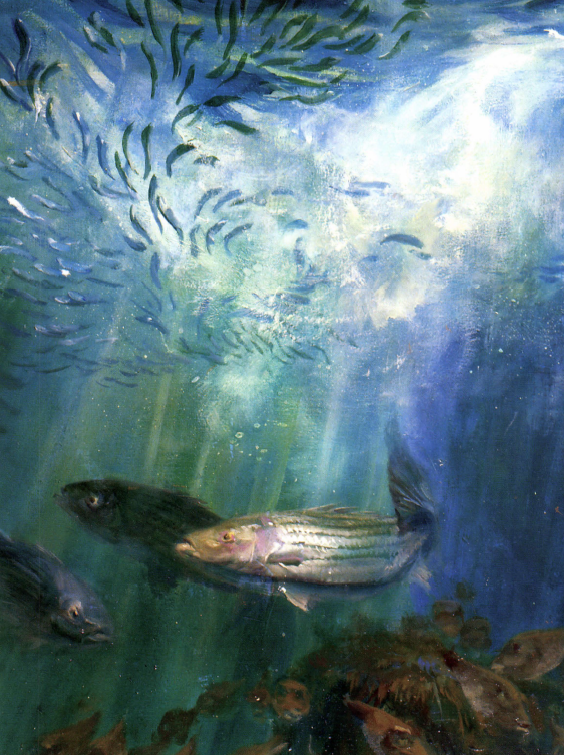 Through the canal, with the tide eastflowing, Roccus moved under Sagamore Highway Bridge, past Paddys Reef, past the dolphins in the morring basin across from The Blinker, past breakwater and sandcatcher and into the surge of Cape Cod Bay, where the half-flood kicked a chop of 71-degree surface water against tile current. A light easterly behind the fetch of sea added to surface commotion at the canal’s east entrance.
Through the canal, with the tide eastflowing, Roccus moved under Sagamore Highway Bridge, past Paddys Reef, past the dolphins in the morring basin across from The Blinker, past breakwater and sandcatcher and into the surge of Cape Cod Bay, where the half-flood kicked a chop of 71-degree surface water against tile current. A light easterly behind the fetch of sea added to surface commotion at the canal’s east entrance.
Roccus felt an uneasiness. She moved across the Sagamore bar where sand eels and sperling silvered the surface.
The school tuna harassing the summer squid were between 20 and 40 pounds in weight, fish which in the larval stage three and four years before had measured only a quarter in length. Several hundred of these in two or three distinct schools had moved higher along the bay arm from the Barnstable traps where they had gorged on herring. Now they moved through and under acres of the small red squid, gorging again.
It was not coincidence that the adult members of their family were in the same area. Departing from the fathom curve of their migration highway between the tip of Cape Cod and Nova Scotia, they had moved in from Wood End to intercept the mackerel that swam with the east wind. They raced at great speed effortlessly. Between their bullet-shaped heads and their tails of tremendous power there was no line of water resistance; their giant fins fitted into grooves in their bodies. Sun rainbowed the spray above them when they surfaced; they made a slice caused by the slimy substance adhering to their tiny scales. The slick made a pattern of betrayal on the water.
Orcinus the killer whale was leader of a pack that had sped south with the Labrador Current, then followed a bent course inside the Gulf Stream to a point three miles off The Race. There, they had been sighted, an even dozen of them, and reported by two draggers inbound from the Georges Bank. They had been seen in combat with a finback whale of 60 feet, which they had mortally wounded but upon which they had not fed. They had come south to feed on the tuna.
Orcinus was 29 feet long, with huge rounded flippers, great tail flukes and a dorsal fin, curved with age, more than five feet in length. About three-quarters of his scaleless skin was black, but his chin and belly were white and there were white oval patches above each eye. In his pack were six males only slightly smaller. The five females were less than half as large, and their flippers, flukes and fins were disproportionately smaller, perhaps a quarter of the size of the males’. These were the gangsters of the Atlantic and their molls, unmatched in ruthlessness, working with a mob instinct that struck terror to the hearts of the largest whales and sharks.
Off Barnstable the killers had intercepted the trail of the tuna and soon began to take toll of them in all sizes. A 40-pound schoolfish was a half-bite appetizer for Orcinus, a 500-pound bluefin a two-bite hor d’oeuvre. Despite the speed of the tuna the killers overtook them at will. Yet they did not harry them ceaselessly. They withdrew as their appetites were satisfied, so that the bluefins were not completely stampeded.
Now, having swum outside the tuna for several miles during half a day while the bluefins, their alarm diminishing, resumed feeding, the killers drove toward the land again and the giant tuna fled before them among the schoolfish. The schoolfish turned over the shoals in terror.
Inside Roccus there was no hunger except a yearning which had no significance for her senses. She moved leisurely across the Sagamore bar and onto the shoals off Scorton Harbor Creek in Sandwich. There, encountering extreme shoaling, she finned farther off the land. And farther off the land, where the water deepened to eight fathoms, Orcinus hit her.
The bass had brief warning. A tuna of about 20 pounds arced into her vision, leaped and twisted and turned offshore again. Roccus followed from curiosity and met, nearly head on, a giant tuna in a glide of frenzy, in flight before the closely following killer.
Orcinus saw Roccus only as a blurred shadow suspended where no shadow should be. He chopped at her with one side of his jaw in the flash of his passing. His 22 conically pointed teeth on that side sliced into the caudal peduncle of the bass– nearly to the backbone– just failing to sever.
Tuna and killer whale vanished as quickly as they had appeared. Roccus, seeking shallower water, swam slowly and with great exertion. Her broad tail, the propeller of her normal action, was fouled and its driving force drastically reduced. She was severely injured.
On the second night after being wounded by Orcinus, Roccus swam awkwardly with the tide in the starry shallows past Sandwich Harbor Creek to the deep of the canal’s east end; and as the west tide began to flow, she gave her hurt self to the pull of it and, dropping deep, moved through. The wound on both sides of the wrist of her tail attracted two lampreys, which she brushed off a mussel bed, but cunners followed her, as did dogfish, drawn by the flow of her life in the tide’s life.
Her life was a life of great tides and currents but this life of the moon’s tide was small; the moon was in quarterstage, and the rips were slow to make. This was a windless night when the eelrig bouncers got much distance in their casts but took few bass. Roccus saw a dozen slow-moving, blue-backed, white-bellied skins, inflated with water, move within her striking distance and withdraw with tantalizing tail action. Hungry, she might have struck. She did not hunger.
Before the new day crept under the span of the railroad bridge, she had reversed her journey through the canal and was again in Buzzard’s Bay.
The wound confused her, rather than pained. The alarm building within her was the result of confusion.
Stena, the roseate tern, was fishing. From her lookout on the high bank of the point near where Roccus rested, the bird watched the schools of baitfish congregating near shore. The sun lay slightly behind her, past its zenith.
When there was a sufficient concentration of the small prey milling about, Stena performed the Trick of the Menacing Shadow, launching herself and swooping to within a few feet of the water. Her shadow panicked the bait, which showered ahead of it, and the tern of greatest symmetry dipped to scoop baby herring and sand eels, some of which she took from the air.
Lying under four feet of water on the warm silt bottom, Roccus watched this performance for an hour, at the end of which Sterna had her fill. The bass moved slowly to feed on wounded, fluttering bait.
Sun beat down on the surface of the river. No wind moved that surface, no fish, no bird. The tide had reached the peak of the salt mark on the marsh grass. Baitfish kept to the cooler depths over sand, worrying shell lately turned by the quahoggers. Plankton clouded the iris-blue water. A kingfisher swooped but held its dive over a cloud of minnows too deep to reach and returned with a cry of angry frustration to its lookout at the brittle tip of a dead cedar.
Blue crabs crawled the bottom and, in the weed, crept up on partially opened seed scallops, and on the bars snuggled with their hinges against small rocks, waiting for clam snouts to show. They could move fast and in any direction.
A late-spawning horseshoe crab pushed sand like a bulldozer. Fiddlers, their homes flooded, crept along cautiously, hunting shrimps and sand fleas and the broken clams gulls had dropped for cracking when the tide was down.
In a hole 14 feet deep, of an old windwheel once used to make electricity for a pump, Roccus rested with her chin in mud, expelling water at an accelerated count, turning on one side, then the other; to present the healing wound at the base or her caudal to the black ooze, the warm and salving ooze. So she had rested for days moving into weeks since Orcinus had struck her, feeding lightly and not more than twice a week she wasted away. She was still a great fish, but her depth and thickness had diminished, the deep bulge of her belly had vanished; she was flabby in her underside, there was an unhealthy sheen on her gill covers and no sea lice sought her as host.
August waned. Days of intense heat were followed by brief tempests that failed to clear the air. The dawns were red beyond the eye of the sun. Chain lightning, distant, licked the evening sky. There was no thunder. A season was approaching its end and the approach communicated itself to all life.
Man witnessed the quick ripening of his tomatoes, the sudden, overnight toughening of his corn, the withering of his potato vines, the indefinable feeling that a chore so long delayed as tacking a new tin blade on his snow shovel had better be attended to. There were days and weeks and possibly months before a sterner season claimed the earth, yet the grasp of change was on it.
The terns, their young flown, were hungrier for themselves; the mackerel gulls were less lazy; the fierce-winged gannet dived from greater height. The curlew cried above the moor at night and the plovers called at daybreak. The young of the native black ducks tested their strengthening wings above the guzzles. Sandpipers and swallows flew in clouds, and in the marsh the redwinged blackbird tucked her song beneath her wing.
In the dunes the hares developed a scent the gray fox could follow, and in the marsh the muskrat made a tentative selection of winter quarters. The otter ranged far, and in the night his whistle was a distant locomotive.
The life of’ the sea also felt change. Tuna coursed east, the killers in their wake. Cod and haddock began an inshore movement and the whiting went into the surf’s first roller. Bluefish followed the whiting into the surf and the scup turned south. Off the beaches the young of the menhaden were nearly four inches long and the adult fish had disappeared; some said the pogy fleet had taken all of them, but they had merely moved into deeper water; a movement that was scarcely more than a drift accomplished on the ebb of a high-course tide.
Off Plum Island and Parver River, off the estuary of North and South rivers, off the Gurnet, outside Saquish and Clarks Island, off the Cape Cod Canal and Sandwich Harbor Creek and Scorton Harbor Creek, on shoals, the young striped bass began to school, school joining school, for southward migration, a movement wholly depending upon the movement of baitfish, which in turn, depended completely upon the development of weather.
Roccus, mending slowly, felt a similar urge, though the schooling fish were mostly between five and 15 pounds. Pods of the larger migrating fish usually formed later. She began to feed on the fugitive small bait, on a few late softshelled crabs. She mended slowly.
On the last night of the August moon, while a tempest cloud covered the crescent, Roccus dropped back through the narrows, down the river and into the pulsing sea. Her wound had not healed completely and never would; she swam with half the strength of her usual tail thrust and only half her eagerness of questing. Otherwise, she had the fair health of old age and a sudden desire to be gone to the far waters of her birth. With the tide she dropped back, until she reached the Mashnee Shoals at the western approach of the canal.
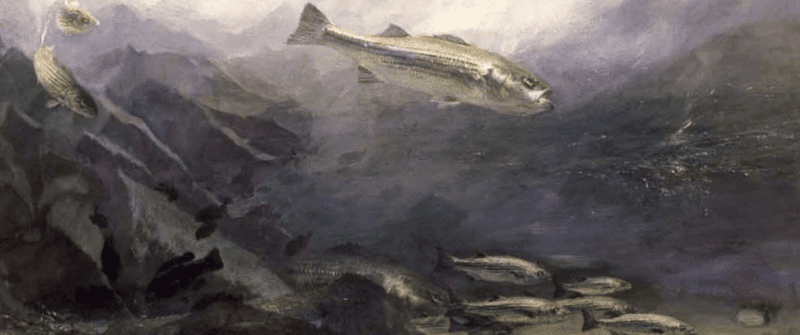 To the submerged granite boulder on the Bird Island ledge, where she had paused in her migrations of many years, Roccus made her way, driven by the urge to begin her southward journey. For three days of early September she occupied this hold. She gained strength as the wound at the wrist of her caudal healed despite its fouling, and her appetite returned. Here in May she had fed upon Anguilla, and here now the eels dropping back from the rivers to spawn swam in abundance and were tasty and nourishing.
To the submerged granite boulder on the Bird Island ledge, where she had paused in her migrations of many years, Roccus made her way, driven by the urge to begin her southward journey. For three days of early September she occupied this hold. She gained strength as the wound at the wrist of her caudal healed despite its fouling, and her appetite returned. Here in May she had fed upon Anguilla, and here now the eels dropping back from the rivers to spawn swam in abundance and were tasty and nourishing.
These were bright days of mistrals at dawn, warming surface after the hours of sun, and cool nights when the pattern of the universe beyond earth was mirrored on the frosty tides.
No striped bass joined her on the Bird Island ledge and on the night of the third day of her life, there she returned to the Mashnee shore. The instinct of early migration remained strong within her; but she was possessed by a stronger urge to seek the company of her kind.
Off Mashnee smaller bass were beginning to school. Some had passed through the canal from Cape Cod Bay, others were from the rivers and harbors adjacent to the canal’s west end. These fish were restless, undetermined in their movements, uncertain, wavering with the tidal changes, held in the gathering place by the flow of feed on the canal edge, waiting on the weather.
Roccus joined a school of bass in the 15- to 20-pound class. She was neither welcomed nor made unwelcome. She swam in a flanking position like an outrider edging a herd of cattle.
Three pods of bull bass that had summered in Cape Cod Canal, one group of fish individually approaching half the size of Roccus, joined the school to which Roccus had attached herself. Two days later more than 100 striped bass from six to 12 pounds each joined up. All acted in response to the same urging that moved the matriarch for company of her species in a journey of varying lengths, none short, to the warmer waters of early life.
In the rips and backwaters the young menhaden and herring and the silver eels were plentiful. The nights were noisy as the bass fed and fattened on them. Only Roccus fed and strengthened, yet did not grow in size. Despite her healing, her feeding, her strengthening, she continued to waste away.
Now the nights were cold, and the surface water, from the night air, was sometimes colder than the depths, and in the limitless element above the sea, migrating birds were a-wing to lesser latitudes, quiet in the passage.
Roccus felt the change of pressure on the weight of waters at the Mashnee gathering place of the tides. Of the great and growing school of bass, she alone felt it, being wiser in age and experience. It was a subtle change, not marked, telling her that heavy weather was definitely approaching, though not yet close. Only five barometers hinted this change; most did not. Yet next day all the school felt it, the larger fish first.
It was a signal for application to appetite, for satiation beyond appetite, for gorging against the needs of a journey that would begin at the height of the storm and allow no interval for seeking food. With the storm the school might move along to Cuttyhunk or to Sakonnet area, or even as far as Montauk Point; it would positively move from Mashnee and during passage, it would not feed.
Roccus fed almost exclusively on the migrating eels, whose oily flavor, more pronounced now than that of young menhaden, she somehow needed. These she pursued at leisurely pace, approaching them from behind, accelerating to seize them from behind, accelerating to seize them broadside at the head. Some she bit in two, others she swallowed whole. Her best hunting was at night, when the eels were most active, emerging from their hiding places.
Because a high-pressure area from Canada slowed the storm’s progress up the coast from Hatteras, the weather held fair beyond the time Roccus’ instinct told her it would foul. The barometer even showed a slightly upward trend.
So came a cloudless night of thin moon, nearly dark o’ the moon, a windless night, the sea flat, cold except for a distinguishable offshore ground-swell. In the marshes, gathering black ducks were raucous. A flight of geese went over.
Hunger blinded caution, or Roccus would not have struck at the false Anguilla that darted past in a haze of phosphorescence. The very force of her strike, while it set the sharp hook, snapped the line with a vicious jerk that amazed the trolling, half-dozing angler.
Downtide, sounding, Roccus fought her doom with the utmost of her half-mended strength. Her savage strike had driven the head hook of the rigged eel through the roof of her mouth, and the barb of the middle hook had pierced her tongue and lower jaw. As pain stabbed her and she swirled, the tail hook of the false Anguilla slapped under her open gill cover and secured itself in her rakers.
A resistance which sought to turn her course, a sensation she had experienced in other misadventures, quickly ended. But one hook bled her gills, and the others like a chain bolt on a door, secured her jaws, nearly locking them. Her breathing became labored. She was in a state of slow suffocation.
She surfaced in a flurry of panic, violently shaking her head, circling, creating a disturbance, which in decent weather would have attracted the gulls from afar. This day the gulls were on the beaches or the pierheads or the rocks or riding the updrafts of’ the wind above the faces of the dunes. None observed her.
She drove for the bottom again, but not to rest. Although the pain of the hooks, a sudden reflex of her nervous system, subsided, there grew within her a feeling of bursting and a terror of the unknown that gripped her jaws. Without sense of direction or purpose, regardless of changing pressures, she swam swiftly about, often striking the rocks.
This phase of her struggle lasted for hours, but her strength waned as the day waned and the storm gathered itself for night assault.
Finally her terror vanished and her aimless movements ceased; and in the late afternoon, the ebb tide nearly spent, herself spent, she gave herself to the tide, unconscious, drifting with it, her fins moving only from the turbulence of the water, and an uncontrolled trembling in all her muscles. Her tail was completely paralyzed.
Through the quickfall of night, into the first of the tide’s resurgence, life clung to Roccus rather than she to life.
Then it was full dark and, though the heavy clouds completely obscured the new moon and the constellations, there came a moment when it seemed as if Roccus had entered again the spangled shallows of her youth. The golden burst of Capella in Auriga fired the sea. Bright were Deneb and Altair and Algol, and bright was Jupiter below the Great Square of Pegasus. And suddenly all of the planets and their moons, every one of the myriad stars, were pouring down the tide, streaming down the tide that had turned for home.
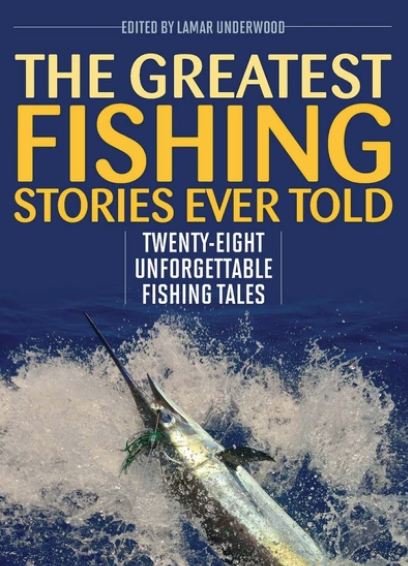 The Greatest Fishing Stories Ever Told is sure to ignite recollections of your own angling experiences as well as send your imagination adrift. In this compilation of tales you will read about two kinds of places, the ones you have been to before and love to remember, and the places you have only dreamed of going, and would love to visit. Whether you prefer to fish rivers, estuaries, or beaches, this book will take you to all kinds of water, where you’ll experience catching every kind of fish.
The Greatest Fishing Stories Ever Told is sure to ignite recollections of your own angling experiences as well as send your imagination adrift. In this compilation of tales you will read about two kinds of places, the ones you have been to before and love to remember, and the places you have only dreamed of going, and would love to visit. Whether you prefer to fish rivers, estuaries, or beaches, this book will take you to all kinds of water, where you’ll experience catching every kind of fish.
Read on as some of the sport’s most talented writers recount their personal memories of catching bass, trout, bluefish marlin, tuna, and more. Explore the Pacific with Zane Grey, as he fights a 1,000-pound blue marlin, or listen as A.J. McClane explains just what it really means to be an angler. Take a step back in time when you read Ernie Schwiebert’s tale of fishing a remote lake in Michigan, when he was still only a young boy. Each of these stories, selected because of its intrinsic literary worth, reinforces the unique personal connection that fishing creates between people and nature. Buy Now

